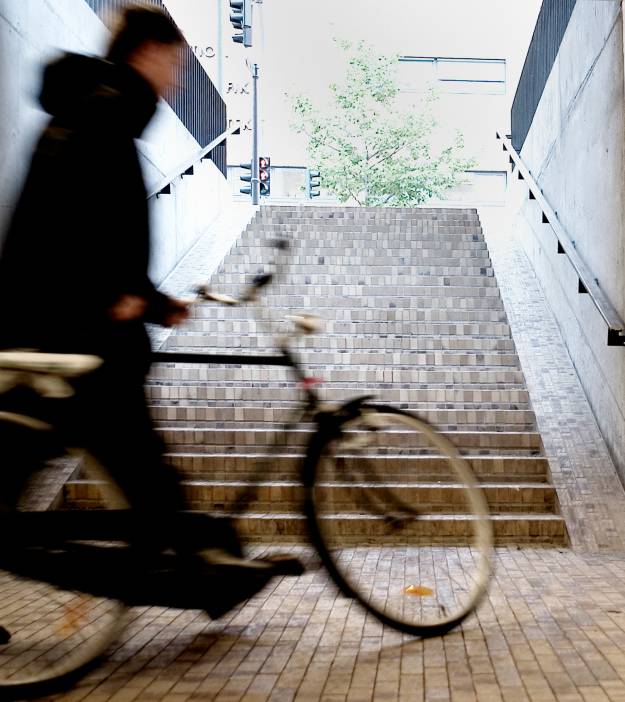Speaking at the opening session of the All Party Parliamentary Cycling Group’s ‘Get Britain Cycling’ inquiry, British Cycling’s Martin Gibbs said that “commitment, investment, political leadership and a clear strategy” were needed to make Britain a first class cycling nation.
Witnesses at the first session of the All Party Cycling Group’s Get Britain Cycling inquiry were in agreement that political will and leadership is needed to ensure that cycling is put at the heart of the government’s transport and health policies – so that measures like transforming existing road infrastructure, and promoting cycling across all ages groups are given the impetus and funding allocation they require.
British Cycling’s Director of Policy and Legal Affairs, Martin Gibbs, said “Twenty years ago we won our first Olympic cycling medal of the modern era with Chris Boardman’s gold in Barcelona. With commitment, investment, political leadership and a clear strategy, we're now world leaders in the sport, let's apply those principles to becoming a cycling nation.” Times Cities Fit for Cycling journalist Philip Pank, agreed: “Real change for cycling must come from the very top, it has to come from the Prime Minister down.” All Party Group member Ben Bradshaw MP added that, while the debate was useful, “without proper leadership and investment, we’re not going to see any real changes.”
The focus of the first Get Britain Cycling evidence session was on strategy - including looking at the level of ambition and resources needed to encourage thousands more people to take up cycling. Improvements needed to the transport infrastructure as well as visions for a cultural promotion of cycling in schools and workplaces were also debated.
“Only when we feel comfortable taking our eight year olds or 80 years olds out on the roads will we know that enough has been done.”
Martin Gibbs, British Cycling Policy and Legal Affairs Director
The inquiry heard that some of the funding needed for the rising cost of inactivity to the NHS - £4 billion per year – would be better spent on cycling provision. This idea was championed by the Guardian’s Peter Walker. The CTC’s Campaigns Director Roger Geffen also echoed this point: "Cycling has a huge range of benefits: for our health, our streets and communities, our environment, our economy and our quality of life.”
The promotion of cycling as a viable and safe form of transport for all age groups was discussed at length. Sustran’s Jason Torrance said: “The more people that cycle, we’re finding, the safer it’s becoming. That shows this is down to safety in numbers and cultural change.” British Cycling’s Martin Gibbs added: “Only when we feel comfortable taking our eight year olds or 80 years olds out on the roads will we know that enough has been done.”
Evidence and research from countries that have got it right on cycling was heard by the inquiry. The University of Westminster’s Rachel Aldred pointed out that while Dutch infrastructure is designed to meet five criteria: comfortable, convenient, safe, attractive and coherent, most UK provision meets just one or two of these criteria - virtually never all five.
The session generated huge public attention on social media website twitter with the #getbritaincycling hashtag being placed in the top three trending issues in the United Kingdom.
Summing up the first session, co-Chair of the All Party Parliamentary Cycling Group, Ian Austin MP, said:
“We couldn’t have wished for a more illuminating start to our Get Britain Cycling inquiry. It’s clear to me that political leadership and will at the very top is needed to get thousands more people on bikes and it was fantastic to see all of the witnesses in agreement on the issues that really matter. The level of ambition and expertise in the room was inspirational and I look forward to continuing the discussions next week.”
Representatives from British Cycling, CTC, Sustrans and Cyclenation gave evidence at today’s session. Journalists Peter Walker from the Guardian, Philip Pank and Kaya Burgess from the Times, and Bike Biz’s Carlton Reid also gave evidence. The inquiry also heard from experts Rachel Aldred (Senior Lecturer on Transport at Westminster University), Lynn Sloman (independent consultant on sustainable transport) and Phillip Darnton (Executive Director of the Bicycle Association).
The next session, focusing on safety aspects and the perceived risks associated with cycling, will take place on 30 January. As well as cycling groups, the inquiry will hear from RoadPeace, PACTS, the AA, and the Institute of Advanced Motorists. Law and enforcement will be covered by representatives from the Association of Chief Police Officers, the Home Office and the Crown Prosecution Service, as well as Barrister Martin Porter QC.
![]() Don't forget, British Cycling's Martin Gibbs will be on a Twitter Q&A session on @Britishcycling tomorrow, Thurs 24 January at 11:00am. You can submit your questions via Twitter from tomorrow morning.
Don't forget, British Cycling's Martin Gibbs will be on a Twitter Q&A session on @Britishcycling tomorrow, Thurs 24 January at 11:00am. You can submit your questions via Twitter from tomorrow morning.
For more information about the inquiry, visit: http://allpartycycling.org/inquiry













